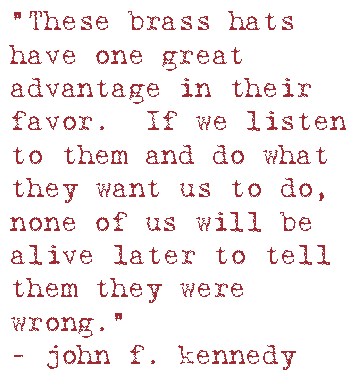Friday, 19 October 1962
As Kennedy struggled to make up his mind about his opening moves, he sought non-military options for the resolution to this crisis. The strain between the civilian leadership and the generals over the security of the nation was worsening as a result. On the 19th, the Joint Chiefs of Staff (JCS) joined the Executive Committee in the 9:45 a.m. meeting. The tense meeting between the generals and the Commander-in-Chief illustrated the frustration the generals had with their civilian bosses.
The men in the room, with the exception of the Army Chief of Staff Earle “Bus” Wheeler, were field commanders during World War II and Korea. Their experiences from those wars confirmed their belief in the supremacy of the Unites States military. They controlled the most powerful military in the world and they arrogantly viewed this young politician with distrust. Subsequently, direction from him was hard to bear. During the meetings on the 19th, the chiefs showed limited ability to restrain their contempt for civilian oversight. The generals were convinced that the military could solve the problem and in order to do so, the decision would have to be made quickly to enable successful execution of their plans to attack and invade Cuba. In their minds, the military held the best options and no other courses of action should be considered.
belief in the supremacy of the Unites States military. They controlled the most powerful military in the world and they arrogantly viewed this young politician with distrust. Subsequently, direction from him was hard to bear. During the meetings on the 19th, the chiefs showed limited ability to restrain their contempt for civilian oversight. The generals were convinced that the military could solve the problem and in order to do so, the decision would have to be made quickly to enable successful execution of their plans to attack and invade Cuba. In their minds, the military held the best options and no other courses of action should be considered.
The most notable evidence of this is found in the heated exhortations from the irascible Air Force Chief of Staff, General Curtis LeMay. LeMay demanded military action in Cuba and at one point accused Kennedy of appeasement. LeMay summed his point by saying, “I just don’t see any other solution except direct military intervention, right now [emphasis in original].” Admiral George Anderson, Chief of Naval Operations agreed, “I do not see that… there is any solution to the Cuban problem except a military solution.” The career staff officer, General Wheeler, Army Chief of Staff, declared that bombing, a blockade, and an invasion were required. He further offered, “I feel that the lowest risk… is the full gamut of military action by us.” Marine Commandant David Shoup concurred with the other chiefs by calling for an invasion. Kennedy demurred saying “I appreciate your views. I’m sure we all understand how rather unsatisfactory our alternatives are.” The tapes that secretly continued to record after the meeting concluded fully illustrate what Stern calls “disdain for civilian control of military decisions.” 18
Military leaders are trained for war. They study war constantly and have devoted their lives to understanding aspects of combat and applications of military power. All but one of the chiefs had significant combat command experience and all were inclined to take their chances on the battlefield with little thought of working doubly hard to stay off the battlefield to begin with. In this manner, the JCS wore blinders that restricted their view of options other than.

